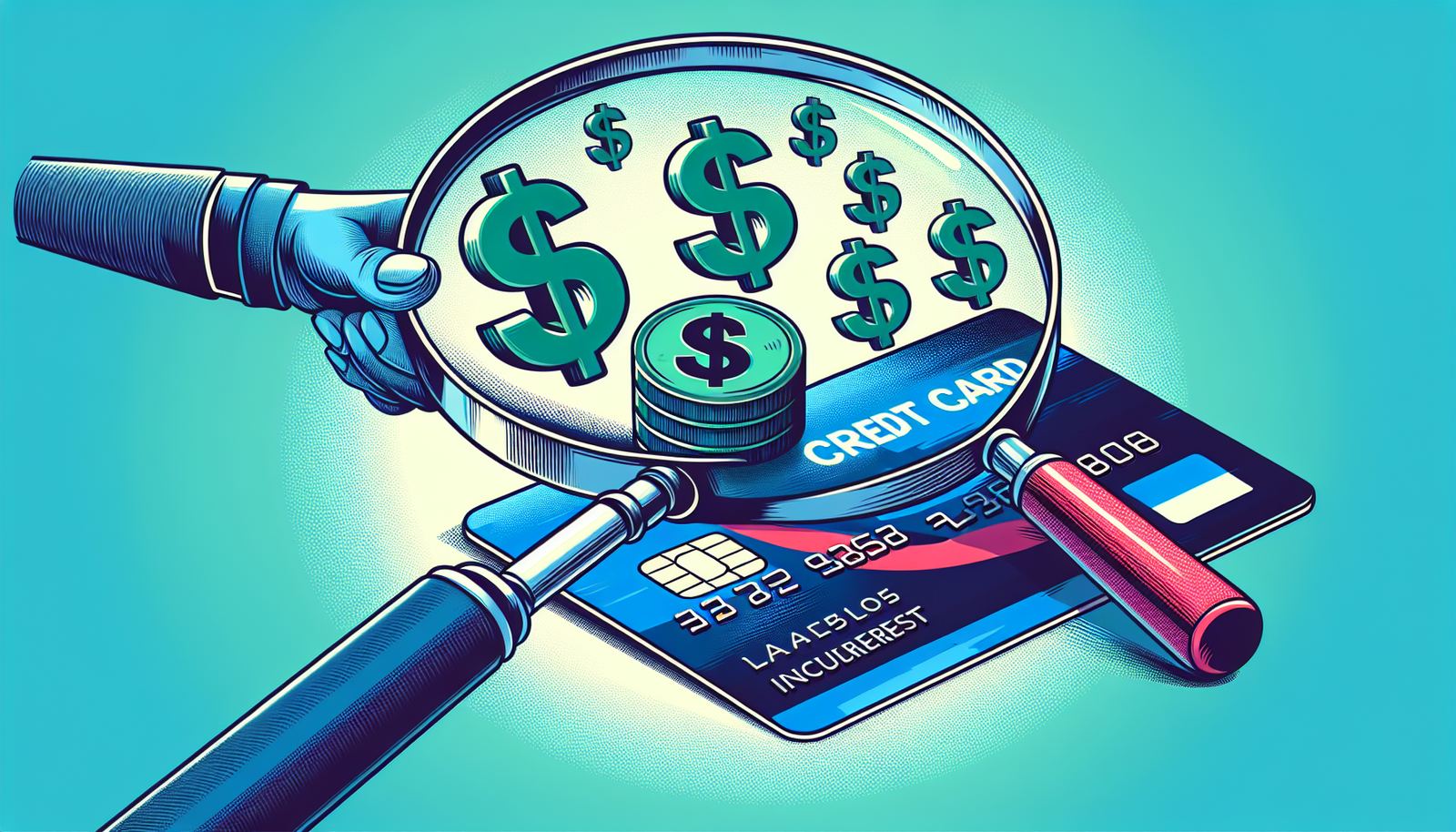Imagine this scenario: you’ve just received your credit card statement in the mail, and as you review it, you notice a section labeled “Interest Charges.” Curiosity piqued, you wonder what exactly these charges entail and how they impact your overall cost of purchases. In this article, we’ll explore the concept of interest charges, their role in accruing interest on your outstanding balance, and the potential impact they have on your financial well-being. So sit back, relax, and let’s embark on a friendly journey to understanding interest charges!
What are interest charges?
Interest charges refer to the additional cost that is incurred when borrowing money or using credit. When you make a purchase on credit or borrow money, interest charges are added to the outstanding balance, leading to an increase in the overall cost of the purchase.
Definition
Interest charges are fees that are calculated based on a percentage of the principal amount borrowed or the outstanding balance on a credit account. These charges are added to the balance and accrue over time until the loan or credit card balance is fully paid off.
Purpose
The purpose of interest charges is to compensate lenders and creditors for the risk they take in lending money or extending credit. It is the cost borrowers pay for the ability to use someone else’s funds to make purchases or cover expenses. Interest charges also act as an incentive for borrowers to repay their debts in a timely manner.
How do interest charges work?
Understanding how interest charges work is essential to effectively manage your finances. Here are some key aspects:
Accrual of interest
Interest charges accrue over time on the outstanding balance of a loan or credit account. This means that even if you make minimum payments, the unpaid portion of the balance will continue to accrue interest, resulting in a higher overall cost over the long term.
Calculation methods
Interest charges can be calculated using different methods, depending on the type of loan or credit account. The most common calculation methods include simple interest, compound interest, and amortization. Simple interest is calculated based on the principal amount borrowed, while compound interest involves calculating interest on both the principal and any accumulated interest. Amortization refers to the gradual repayment of both the principal and interest over a set period of time.
Payment allocation
When making payments towards a loan or credit card, it is important to understand how the payments are allocated. In most cases, payments are first applied to any outstanding fees or charges, such as late fees or penalty fees. The remaining amount is then usually applied to the interest charges, with the remaining portion going towards reducing the principal balance. It is essential to check the terms and conditions of your specific loan or credit agreement to fully understand how payments are allocated.

Types of interest charges
Interest charges can vary depending on the type of loan or credit account. Here are three common types of interest rates that borrowers encounter:
Fixed interest rates
Fixed interest rates remain constant over the course of the loan or credit agreement. This means that the interest rate you initially agree to will not change, regardless of any fluctuations in the market. Fixed interest rates provide stability and allow borrowers to budget their payments accordingly.
Variable interest rates
Variable interest rates, on the other hand, can fluctuate over time, often based on benchmark interest rates or market conditions. These rates are typically tied to an index, such as the prime rate, and can change periodically. Borrowers with variable interest rates should be prepared for potential increases or decreases in their interest charges.
Introductory rates
Some lenders or credit card issuers offer introductory rates as an incentive to attract new customers. These rates are usually lower than the standard interest rates and may only last for a limited time, such as six months or a year. After the introductory period ends, the interest charges will revert to the standard rates. It is important to consider the long-term impact of the standard rates when considering any introductory offers.
Effect of interest charges on purchases
Interest charges can have significant effects on your overall financial situation. Here are two key effects to consider:
Increased overall cost
By accruing interest on the outstanding balance, interest charges increase the overall cost of purchases made on credit. When you make a purchase on credit, you not only have to repay the principal amount but also the additional interest charges that accumulate over time. This can significantly inflate the cost of your purchase, especially if you only make minimum payments or carry forward a high balance.
Long-term financial impact
If not managed properly, interest charges can have a long-term financial impact. By carrying a balance and accumulating interest charges, you may find yourself trapped in a cycle of debt. High interest charges can lead to increasing minimum payments, making it challenging to make progress in paying off the debt. Additionally, carrying a high balance and paying high interest charges may impact your credit score, making it more difficult to obtain favorable interest rates or secure additional credit in the future.

Factors affecting interest charges
Several factors can influence the amount of interest charges you incur. It is important to understand these factors to make informed financial decisions. Here are three key factors:
Credit card terms and conditions
The terms and conditions of your credit card agreement can significantly impact the interest charges you encounter. Factors such as the annual percentage rate (APR), the grace period, and any additional fees or charges can all affect the overall cost of using your credit card. It is crucial to carefully review and compare the terms and conditions of different credit cards to make an informed choice.
Credit utilization
Your credit utilization, which is the ratio of your credit card balances to your credit limits, can also impact your interest charges. Higher credit utilization ratios indicate a higher level of risk to lenders, which may result in higher interest rates or fees. Keeping your credit utilization low can help minimize the interest charges you incur on your credit cards.
Payment history
Your payment history plays a crucial role in determining the interest charges you encounter. Late or missed payments can trigger penalty fees and may result in an increase in the interest rate charged on your outstanding balance. On the other hand, consistently making on-time payments can help maintain or improve your credit score, which may lead to better interest rates in the future.
Strategies to minimize interest charges
Minimizing interest charges can help you save money and manage your debt effectively. Here are three strategies to consider:
Paying off balances in full
One of the most effective ways to avoid interest charges is to pay off your credit card balances in full each month. By doing so, you avoid carrying forward any balance that would accrue interest. It is important to budget and plan your expenses to ensure you can pay off your credit card balance in its entirety each billing cycle.
Transferring balances to lower interest cards
If you have accumulated a significant amount of credit card debt with high-interest rates, you may consider transferring the balances to a credit card with a lower interest rate. Some credit cards offer promotional balance transfer rates, allowing you to consolidate your debt onto one card with a lower interest rate for a specific period. This strategy can help reduce the interest charges and give you the opportunity to pay down your debt more effectively.
Negotiating lower interest rates
In some cases, you may be able to negotiate lower interest rates with your creditors. If you have a good payment history and a solid credit score, you may have leverage to request a lower interest rate. Contacting your creditors and explaining your situation may result in a reduced interest rate, saving you money on interest charges.

The importance of understanding interest charges
Understanding interest charges is crucial for effective financial planning and debt management. Here are two key reasons why it is important to fully understand interest charges:
Financial planning
By understanding interest charges, you can make more informed financial decisions. You can carefully consider the impact of interest charges when deciding to borrow money, use credit, or make purchases on credit. This understanding allows you to plan your finances effectively and avoid unnecessary debt.
Debt management
Proper understanding of interest charges is vital for managing and paying off debt. Being aware of how interest charges accrue over time can motivate you to pay down your debts more aggressively. It also helps you evaluate different repayment strategies to minimize the overall interest charges and pay off your debts more efficiently.
Comparing interest charges among different financial products
Interest charges vary among different financial products, such as credit cards, loans, and mortgages. Understanding these differences can help you make informed decisions when choosing a financial product. Here are some key factors to consider:
Credit cards
Credit cards typically have higher interest rates compared to other financial products. Some credit cards offer low or introductory rates, but these rates are often temporary. It is important to review the APR, grace period, and any additional fees or charges associated with the credit card to accurately compare interest charges.
Loans
Loans, whether personal loans or auto loans, often come with fixed interest rates. These rates are typically lower than credit card rates, making loans a more affordable option for borrowing money. However, it is essential to consider factors such as the loan term, repayment schedule, and any additional fees when analyzing interest charges on loans.
Mortgages
Mortgages provide long-term financing for purchasing a home. Interest rates on mortgages can vary between fixed and variable rates. Mortgages usually have lower interest rates compared to credit cards or personal loans. However, due to the longer repayment term, the total interest charges on a mortgage can be significantly higher.

Tips for managing interest charges
Managing interest charges requires discipline and careful financial management. Here are three tips to help you effectively manage your interest charges:
Tracking spending
Keeping track of your spending allows you to stay aware of the balances and potential interest charges you may incur. Regularly reviewing your credit card statements, loan balances, and mortgage statements helps you maintain control over your financial situation and avoid any surprises. Consider using financial management tools or apps to assist you in tracking your spending and managing your debts.
Setting up automatic payments
Setting up automatic payments can help ensure that you make your payments on time, avoiding any late fees or penalty charges. By automating your payments, you can also take advantage of any grace periods offered by credit cards, allowing you to pay off your balance without incurring interest charges.
Consulting with financial advisors
If you are struggling to manage your interest charges or overall debt, consulting with a financial advisor can provide valuable guidance and strategies. Financial advisors can help you create a realistic budget, develop a debt repayment plan, and explore potential options to minimize interest charges.
The role of interest charges in the economy
Interest charges play an essential role in the economy by influencing consumption and consumer behavior. Here are two key aspects of this role:
Stimulating or slowing down consumption
Interest charges can either stimulate or slow down consumer spending. Lower interest rates can encourage individuals to borrow and spend more, stimulating economic growth. On the other hand, higher interest rates can discourage borrowing and spending, leading to a slowdown in economic activity.
Influencing consumer behavior
Interest charges also influence consumer behavior. Higher interest charges may make consumers more hesitant to make purchases on credit or take on additional debt. This cautious approach to borrowing can help individuals avoid excessive debt and promote responsible financial behavior.
In conclusion, interest charges are an important aspect of borrowing and using credit. They accrue on the outstanding balance, leading to increased overall costs. By understanding how interest charges work, the types of interest rates, their impact on purchases, and the factors that affect them, you can make informed financial decisions and effectively manage your debts. Minimizing interest charges through strategies such as paying off balances in full, transferring balances, and negotiating lower interest rates can save you money and help you achieve your financial goals. The understanding of interest charges is crucial for financial planning, debt management, and comparing different financial products. By managing interest charges effectively and seeking guidance when needed, you can navigate the world of borrowing and credit with confidence.


